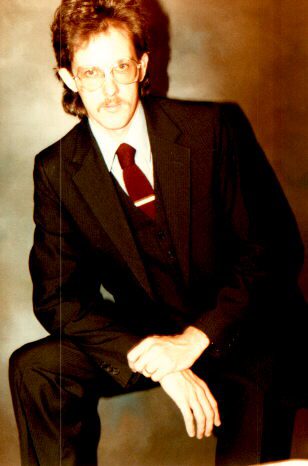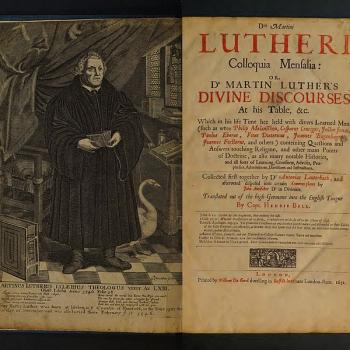Part Five: Collapse of My Protestant Ministry: Disillusionment and the End of One Chapter of My Life, But with Faith Intact (1985-1989)

This is the ten-part story of my complete religious history, from nominal Methodism (1958-1967), to the occult and practical atheism (1968-1976), through evangelical Protestantism, counter-cult, pro-life, evangelistic, and apologetics work (1977-1990), and finally on to the fullness of the Catholic faith in 1991. It is found complete (75 pages) in my 2013 book, Catholic Converts and Conversion.
See All Ten Parts:
Part One: Nominal Methodism, Occult, and the Seeds of a Serious Christian Commitment (1958 – early 1970s)
Part Two: Nature Mysticism, Romanticism, Bible Movies, and the “Great Depression” (1968-1977)
Part Three: Evangelical “Born-Again” (?) Experience, More Lukewarmness, and Personal Revival (1977-1982)
Part Four: Apologetics, Abundant Evangelical Blessings, and Protestant Evangelistic Campus Ministry (1983-1989)
* * * * *
“True Truth Ministries” Apologetic Outreach (1985-1989) [continued]
To make a long and tedious story short: I ran into serious problems in obtaining the proper income. People would promise financial help and not deliver. I was under-supported (to put it mildly) by both churches I attended during this period. I was told that I should pick up part-time work. I did, but it didn’t matter. The same people would find something else to criticize.
The biggest problem, however, was a thing I had long noted and critiqued within evangelical circles: the “success” syndrome, or a pragmatic approach to vocation and outreach. What this amounted to was that the missionary / evangelist had to produce tangible results, and in that world, that meant conversions or “head counts.” If a bunch of people “got saved” as a result of one’s work (in short order), that was successful, and proof positive of God’s blessings upon it. If this wasn’t seen, the outreach was regarded as a failure.
I was actually (rather ironically) already “too Catholic” in one major respect. I didn’t regard the line whereby one became “saved” for all time after having crossed it, as my immediate goal. My goal was to move people further along the spectrum of Christian commitment: whether they crossed the line of “salvation” or not. This was close in several ways to a Catholic understanding, since the Catholic Church views salvation as more of a process or a lifelong walk and endeavor.
Because I was so “low-key” in my approach to evangelism: never wishing to force anyone or put them on the spot in a merely “salesman” or “psychological pressure” manner, I wasn’t (from a strictly human perspective) producing all these conversions that were the mark of success. I expressed this right from the beginning of my ministry, in my first announcement in May 1985 (thus people knew what they were “getting” with me):
I like to refer to my style of witnessing as “people intensive,” in the sense that I’m willing to spend as much time as necessary with each individual, in order to deal with their sincere questions and struggles over various issues. I want my emphasis to be on quality time spent with individuals, talking and listening to them, and not on the quantity of people getting saved (often merely a shallow or strictly emotional “conversion”).
Again, in a ministry report, dated 31 October 1987, I stated:
I’m primarily a “planter” (1 Cor 3:4-11) in a very difficult field, and as such, I don’t often see visible “fruits” of my work. I’m called to proclaim the gospel. . . . I don’t hold to a quantitative, “head-count” notion of “spiritual success,” since this isn’t biblical (e.g., Matthew 7:13-14, 21-23).
I found many evangelicals (even the preeminent Protestant evangelist, Billy Graham himself) who agreed with my view that faithfulness and commitment to our calling is more important than success (as commonly defined). The example was given of Jeremiah the prophet, who preached for sixty years, with no known results at all. Was he a “success”? God and the biblical outlook say yes; modern evangelicalism too often says no.
In my “resume” of 10 April 1989 I again explained my perspective in this respect:
Although my goal is always to see people converted to Christ, if it doesn’t happen, I don’t feel that I’ve failed in my task, since it is not within my power to convert anyone, but rather, this is the work of the Holy Spirit. As John R. W. Stott states:
Evangelism must not be defined in terms of results, for this is not how the word is used in the New Testament . . . Evangelism is the announcement of the good news, irrespective of the results . . . Our responsibility is to be faithful; the results are in the hand of Almighty God. (Christian Mission in the Modern World, Downers Grove, Illinois: InterVarsity Press, 1975, 38-40, 56-57)
Not that I hadn’t made many mistakes, myself. I made many, and have more than a few regrets about that whole period. I was naive about people, overzealous, too impractical, too “radical.” I actually believed that evangelicals would support missionaries, since it was supposedly such a central emphasis in those circles. I tried to “walk the walk” that so many evangelicals were “talkin’” about, but it didn’t work.
But one thing I knew then, and know now, for sure: despite all my own errors of judgment, I was totally, 110% committed to my calling, no matter how much suffering was entailed. I knew I was called to this sort of work, but I had to pay my dues and learn many things the hard way: including coming up against some cherished myths that run rampant in the evangelical world and the intersecting charismatic milieu as well.
If my campus ministry had been a complete failure, I knew at least it was a noble failure, with the very best of intentions. If I was wrong, at least it was for the right reasons. And sometimes I was right, but for the wrong reasons. I wasn’t seeking riches or fame or glory. I was trying to share the gospel and to defend Christian truth: seeking to help people improve their lives.
I also refused to do high-pressure fund-raising. I figured that if God wanted my work to succeed, that He would bring about financial support somehow (a perfectly biblical notion, based on his care for sparrows, the disciples being told not to carry money, and many other similar passages), without me having to talk about it all the time. I believed Him; I had faith! In part, I was reacting strongly against the perception that evangelists were just out to make a bunch of money (which wasn’t my motivation at all). This was the era, after all, of the Bakker and Swaggart evangelical scandals.
I still feel this way today. I don’t use the marketing tactics that many (including in the Catholic world) insist on habitually using: the high-pressure, “crisis-a-month” / “support us now or we’ll go under” mentality that obviously works, or else folks wouldn’t do it. I don’t think it is an absolute, black-and-white matter, but to me it is a standard that I set for myself and try to personally live by.
One has to pay a price for that, and I have (in more than one sense), but there is nothing like remaining true to yourself and your principles. By God’s grace, I have done so, in this respect. I explained, this, too, in my “resume” from April 1989:
I disagreed with the approach to fund-raising which was held in common by all the groups I was familiar with [e.g., Campus Crusade for Christ, Inter-Varsity]. They required what I thought was an excessive amount of high-pressure in soliciting funds. I fully understand why they feel this is necessary (believe me, I do!), but I cannot in good conscience go along with this practice myself – again, not a question of right and wrong, but of individual conscience (Romans 14:1-23).
As of this writing, I’ve been a full-time apologist and author for over eleven years. I’ve only done overt fund-raising efforts twice (and then quite low-key): when I began in 2001, and last fall: due to the drastic effect the economy has had on my book royalties. I’m mostly supporting myself through my own books (what evangelicals would call “Paul’s tent-making model”).
Back in the late 80s, however, I had no books, and few tangible “results” that I could show. I didn’t have (as I do now) a website online for 16 years, with over two thousand separate posts, that has offered help to thousands of people; or 37 books: nineteen of them “officially” published by established, reputable publishers.
My work has issued plenty of “fruit” by now: if by that we mean reports of those who have become Catholics in some part due to my writing, or even substantial book sales. “Fruit” is indeed a valid biblical concept. The absence of a concrete display of it (according to only one model), however, is not necessarily a disproof of a calling, since there are many kinds of fruit or biblical “success” from God’s vantage-point. That was the point I tried to make – to no avail – in the late 80s.
Collapse of My Ministry and Disillusionment and Confusion
Because I had little to “show” for my efforts back then, the financial support dried up (although 94 separate individuals or couples had contributed to my work; several on a regular basis), leading me to despair of the whole effort and to pack it in by October 1989: with no idea whatsoever of what I would do with my life, or what God could possibly have in store for me. I was burned out and descended into a cynicism of sorts: “why bother anymore?”: that type of attitude. Only the unwavering support of my wife Judy sustained me.
I had to somehow explain to myself (and to supporters of mine in my ministry): what had happened: how I could stop doing what I had always strongly asserted that I was called by God to do. This is a portion of my final report that I sent out for True Truth Ministries; dated 30 October 1989:
I am in the advanced stages of what is called “ministry burnout” . . . all ministry, paid or otherwise, is an intense spiritual battle by definition. . . . 4 ½ years of the Enemy’s darts and, unfortunately, some arrows from within the Church, as well as life’s usual problems, have taken a heavy toll. I accept the lion’s share of blame for this. My own lack of fervent prayer and perseverance are likely a major, if not the predominant cause. . . .
I’ve spoken before of the “catch-22” of trying to produce “results” in ministry, which is usually required for financial support, yet with less and less time to do so due to the demands of secondary sources of income . . .
Furthermore, it’s obvious that effective ministry, in a person-to-person sense, requires much time to show the unsaved person that he or she is truly loved. The “tract-and-half-a-minute” approach will not do when you’re dealing with people’s eternal destinies. . . .
I would rather leave paid ministry instead of compromising my views on how to raise funds in such a ministry . . .
I remain firmly convinced that God has called me to be an evangelist / apologist / teacher . . . Therefore, I believe that what has occurred here is, in essence, a tragedy, as opposed to some kind of “enlightenment” whereby I’ve come to my senses about financial practicality. . . .
God seeks to involve us, His Body, in all of His positive works, such as evangelism, social justice, the transformation of culture, and charity. Now, with reference to full-time ministry, the idea that “God provides if it’s His will” immediately involves other Christians, who may or may not respond, according to free will.
Thus, in my situation, it is not necessarily the case that I am out of God’s will simply because funds are not forthcoming, any more than a Red Cross worker helping the war-wounded is out of God’s will as soon as funding is absent or in short supply. . . .
I haven’t often seen dollars floating down out of the sky from heaven. If I have deluded myself as to my calling, God will reveal that to me in one way or another, but I don’t believe He has done so. My heart and life belong to Him, and I’m committed no less now to doing His will and continuing the activities I’ve been involved in, than formerly.
That was the “bravest face” I could show the world, and I truly meant every word I wrote (it wasn’t a mere show, or “evangelical boilerplate”), yet emotionally and spiritually, deep down in my soul, life seemed absurd and out-of-whack. I thought I was trying to follow His will. This was all I wanted to do with my life, and what I strongly felt God wanted me to do, yet it didn’t work, and here I was at age 31, seemingly a complete failure with no future.
I felt like I imagine people do who are victims of a divorce they don’t agree with. I had given it my all and it wasn’t good enough to even sustain the effort. What was to become of my calling? Would the whole thing turn out to be a self-delusion from the get-go? It seemed like a cruel joke. I was thoroughly confused; didn’t understand how and why all this had happened, besides understanding that I was perceived as not having produced any “fruit”; therefore unworthy of financial support.
It was like the great scene in the Humphrey Bogart / Katherine Hepburn film from 1951, The African Queen, where they think they have come to the end of all hope, down a disease-infested, dead-end river. They thought that they had made a tragically wrong choice (of what river to travel down) and went to sleep in despair, thinking that they would die.
Then the camera slowly pans up and the viewer sees that there is a big lake just a few yards away. During the night rain providentially falls and lifts the boat over to the lake.
Like that scene, God could see what the future held for me (He was already there), and He had a plan for my life (if I would work together with Him in my free will). I didn’t see what was to come: nor could I have ever guessed it in my wildest dreams. Yet I held on to some measure of faith and didn’t despair. I wasn’t going to re-live the nightmare of 1977 again.
I felt very let down by lots of people (including fairly close friends), but not by God. I didn’t blame Him, and still believed that He would use me somehow in the work of apologetics and evangelism, and recognized that I simply couldn’t see or comprehend yet what His plan might be.
I would have to wait once again: as I have had to do so many times in my life, at major crossroads: for my wife (eight years), getting a book published (seven years), having children (after six years of marriage), having a daughter (age 43), full-time Catholic apologetics (also age 43), and many other lesser things.
I knew in 1981, beyond any doubt, that I was called to apologetics in some serious fashion. In 1989, I had failed as a campus missionary. I wouldn’t get back to full-time work in my vocational field until twelve years later, 2001: a full twenty years after I was called to it.
***
Photo credit: The evangelical Protestant campus evangelist in October 1987 (age 29): still three years away from being persuaded of the full truth of Catholicism.
***













